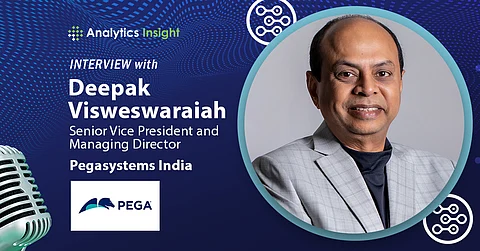

Generative AI is advancing quickly, yet many enterprises are using fragmented deployments, implementing AI tools without a cohesive strategy. Use cases, like chatbots and content generators, remain limited, leaving the broader promise of enterprise-wide intelligence and adaptive decision-making out of reach for most organizations.
In this episode of the Analytics Insight podcast, Deepak Visweswariah, Senior Vice President and Managing Director at Pegasystems India, urges companies to shift focus from isolated implementations to integrated ecosystems. His message is clear: “Siloed tools don’t change companies. Smart ecosystems do.”
Many businesses see Gen AI as a simple solution, using chatbots for customer support or code assistants for IT in isolation. While effective in the short term, these tools often fail to share data, context, or intelligence across departments.
“It’s like installing air conditioning in only one room during a Chennai summer,” the senior vice president quips. The real issue, he believes, is the proliferation of ‘AI islands’, completely disconnected tools that limit the enterprise from leveraging the true potential that AI offers to it.
Visweswariah said that companies need orchestration instead: a unified layer that connects Gen AI tools with business logic, workflows, and human judgment. “When AI is orchestrated across the enterprise, you’re no longer solving problems in silos; you’re aligning technology to outcomes.”
This orchestration acts like a central nervous system, enabling context and intelligence to flow across departments, driving adaptability and continuous learning.
The Pegasystems MD outlines five key principles to build more innovative applications:
Start with business problems, not technology. Solve for churn, inefficiencies, or compliance delays.
Augment, don’t replace humans. Let AI support decision-making.
Make systems adaptive, learning from usage and outcomes.
Bake in trust and governance, especially in regulated sectors.
Foster mindset change, ensuring that adoption matches innovation.
Technology alone isn’t enough; change management and culture shifts are essential.
Traditional metrics such as cost savings or headcount reduction do not capture the value of Gen AI. Instead, the Pegasystems executive recommends measuring outputs such as quicker resolutions, improved quality of decisions, and enhanced customer satisfaction.
In the future, the Pegasystems India executive envisions AI converging toward autonomy, integrated intelligence at scale, and explainability as a guiding principle. Governance in this future is not merely about compliance; it’s a competitive advantage.
His concluding comment is both a caution and a vision: “It’s not just about Generative AI being a smarter algorithm. It’s about building an intelligent ecosystem, one that can adapt, learn, and evolve with the business.”
